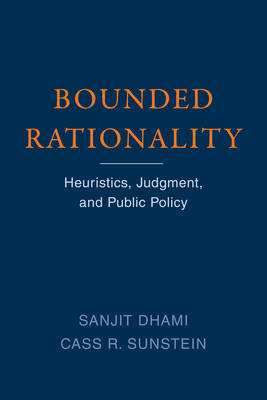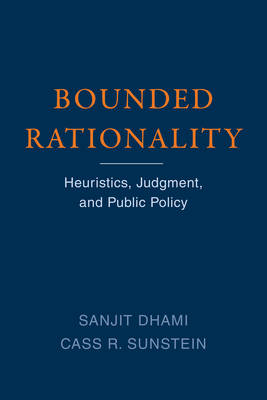
En raison d'une grêve chez bpost, votre commande pourrait être retardée. Vous avez besoin d’un livre rapidement ? Nos magasins vous accueillent à bras ouverts !
- Retrait gratuit dans votre magasin Club
- 7.000.000 titres dans notre catalogue
- Payer en toute sécurité
- Toujours un magasin près de chez vous
En raison de la grêve chez bpost, votre commande pourrait être retardée. Vous avez besoin d’un livre rapidement ? Nos magasins vous accueillent à bras ouverts !
- Retrait gratuit dans votre magasin Club
- 7.000.0000 titres dans notre catalogue
- Payer en toute sécurité
- Toujours un magasin près de chez vous
Bounded Rationality
Heuristics, Judgment, and Public Policy
Sanjit Dhami, Cass R Sunstein
Livre broché | Anglais
88,95 €
+ 177 points
Description
Two leaders in the field explore the foundations of bounded rationality and its effects on choices by individuals, firms, and the government. Bounded rationality recognizes that human behavior departs from the perfect rationality assumed by neoclassical economics. In this book, Sanjit Dhami and Cass R. Sunstein explore the foundations of bounded rationality and consider the implications of this approach for public policy and law, in particular for questions about choice, welfare, and freedom. The authors, both recognized as experts in the field, cover a wide range of empirical findings and assess theoretical work that attempts to explain those findings. Their presentation is comprehensive, coherent, and lucid, with even the most technical material explained accessibly. They not only offer observations and commentary on the existing literature but also explore new insights, ideas, and connections. After examining the traditional neoclassical framework, which they refer to as the Bayesian rationality approach (BRA), and its empirical issues, Dhami and Sunstein offer a detailed account of bounded rationality and how it can be incorporated into the social and behavioral sciences. They also discuss a set of models of heuristics-based choice and the philosophical foundations of behavioral economics. Finally, they examine libertarian paternalism and its strategies of "nudges."
Spécifications
Parties prenantes
- Auteur(s) :
- Editeur:
Contenu
- Nombre de pages :
- 552
- Langue:
- Anglais
Caractéristiques
- EAN:
- 9780262543705
- Date de parution :
- 12-07-22
- Format:
- Livre broché
- Format numérique:
- Trade paperback (VS)
- Dimensions :
- 150 mm x 226 mm
- Poids :
- 657 g

Les avis
Nous publions uniquement les avis qui respectent les conditions requises. Consultez nos conditions pour les avis.






